- Home
- Gaelen Foley
His Wicked Kiss Page 5
His Wicked Kiss Read online
Page 5
Though not normally given to damsel rescues and other good deeds, he shook off his momentary daze, more than happy to make an exception and play the hero in this case. “Good day, miss,” he greeted her, prepared to offer his assistance. “I see you’ve gotten yourself into a spot of trouble up there.”
“I have?” she asked warily, tilting her head. “How’s that?”
Jack furrowed his brow. Her self-possessed response startled him; he had expected more of a cry for help. He glanced discreetly at his men; they shrugged, as perplexed as he.
He turned to the girl once more as she drew off her leather work gloves and then picked a leaf out of her hair with a small scowl. “Is everything, er, quite all right?”
“I think so,” she said warily, eyeing him as though he were the oddball. “Is everything all right with you?”
“Of course.” Jack was nonplused and beginning to wonder if they were speaking the same language. “That doesn’t look very safe,” he pointed out. “Do you need help getting down?”
“Oh!” she answered with a sudden, startled laugh. “No, I don’t need any help getting down. But I’m sure you’re very kind,” she added indulgently.
Jack stared at her in perplexity. “What the blazes are you doing in that tree?”
“Studying epiphytes.”
“Epi-whats?” Higgins muttered.
“Orchids,” she clarified.
“Those parasitic flowers growing all over the trees,” Jack told him in a rather jaundiced aside, folding his arms across his chest. A comparison to most of the women he knew came to mind, but he kept it to himself.
“Orchids are not parasites!” the young lady informed him with great indignation.
Jack cocked an eyebrow. Hmm. Not only had the chit not fled in terror of him, but now she dared contradict him to his face.
Obviously, she had no idea who he was.
“Quite the contrary,” she continued, “and I can prove it if you like, for I have just made a most astonishing discovery!”
“Have you?” he echoed, certain that her discovery could not be any more astonishing than his present one—namely, her.
She nodded emphatically. “I have just learned that the symbiosis between the epiphytes and these canopy giants goes even deeper than we ever previously suspected!” She looked irked with herself the moment she had blurted it out, as though she realized after the fact how tedious scientific conversation might be deemed in some circles.
Jack was secretly amused and gave her the slightest encouragement. “You don’t say.”
“Shall I explain?” she offered, lighting up.
“I don’t think she gets out much,” Trahern murmured under his breath.
“By all means,” Jack invited her, masking his amusement. He silenced his chuckling men with a curt order.
Visibly pleased by his interest, the little oddball warmed to her topic. “Oh, it’s very exciting! These orchids, you see, have flourished on this tree branch for many generations, lived and died and then decayed right here on this thick bough, until eventually, over a number of years, they’ve created their own little bed of soil and mulch, right here on the branch. They don’t need any soil of their own to grow in, of course—far from being parasites, they have special roots that allow them to suck the water right out of the air, you see, like this rain.” She held out her cupped hand to catch a few raindrops as she looked up into the drizzling canopy.
When she tilted her head back, his stare homed in on the damp white fichu tucked into the neckline of her gown, a gauzy covering that clung to her demure cleavage.
“Is that…right?” he murmured faintly, struck by a jolt of unexpected lust.
“Quite. Here!” Leaning down to toss a purple flower to him, she nearly gave Jack a fit of apoplexy in his certainty that she was going to fall out of the tree and straight into the mouth of a crocodile. But she was blithely unconcerned for her own safety. “Today I discovered that these little orchids give back to the tree that shelters them in the most wonderful manner.”
“How?” he asked, drawn in to her little mystery in spite of himself, and perhaps just a wee bit enchanted.
“They feed it. Look.” She lifted up a cross-section of what appeared to him to be mere grubby turf. “When I cut into the orchids’ bed of soil here for closer study, I discovered that the tree had actually begun sending these little rootlike structures right out of the branch so that it could take in nutrients from the mulch that generations of decaying orchids had created here. Don’t you see what this means?”
Jack attempted to answer, but thought better of it. He just shook his head.
She laid her hand on the massive branch that she was sitting on and gazed up wistfully into the canopy. “They give to each other, neither harming the other. This great big mahogany gives this tiny, delicate flower shelter and solid support, while the orchid, in turn, creates nourishment to help feed the tree and keep it strong. They live together in perfect harmony, and isn’t it just so…beautiful?”
Jack stared, mute with a very male sense of admiration.
He wasn’t much for botany, and though miraculous, the arrangement between the flower and the tree did not seem half as rare and beautiful to him as this dainty, eccentric little bluestocking.
He knew now who she was.
His acquaintance with Victor Farraday and his younger sister, Cecily, went back to their days in England twenty years ago, though both he and Victor were expatriates now. The last he had heard, the famed naturalist had disappeared into the Orinoco Delta and had not been heard from since.
“You’re Dr. Farraday’s daughter,” he informed her.
She straightened up proudly with a nod. “And you are Lord Jack Knight—though Jack is really just a nickname for John. So I’m told.”
If he had been astonished before, he was now thrown completely off kilter. “You know me?”
She laughed. “I saw you before. At an assembly ball in Kingston.”
“Really?” he echoed again, even more faintly this time. The world was feeling more than a little topsy-turvy.
“Yes,” she declared with great certainty. “I believe you had on a black coat.”
“You were at a ball I was attending and I did not notice you? Highly unlikely—ah, unless your father made a point of keeping you out of my sight.”
“Perhaps,” she admitted with a slight hint of flirtation sparkling in her eyes.
Jack was not quite sure what to make of it, but he gazed at her with a cautious half smile. Either she had not heard, isolated in this wild place, that he was the Devil incarnate, or was too starved for human company to care.
As someone who had little use for the human race in general, Jack found himself strangely moved by her shy but eager smile.
Fancifully, he thought her like a beautiful half-wild princess of this mysterious emerald realm—or a wondrous rare forest animal that had never seen Man before and did not know enough to be afraid.
Total innocence.
But noting the pistol and machete that she wore strapped to her slim waist, he gathered in deepening respect that the lady knew how to take care of herself. No doubt Victor had trained his daughter well in survival skills. To be sure, one look in her green eyes, with their forthright expression of confident determination, warned Jack that she had also inherited her father’s brains.
Epiphytes, indeed.
He cleared his throat. “Is your father, er, at home, Miss Farraday?”
“No, he went to visit the Indians—oh, but don’t go! He should be back soon. Would you like to wait for him? Come and see our camp. I could make tea!”
“Tea? Well—that’s very kind, Miss Farraday, but, ah, it’s ninety degrees.”
“No, it’s only eighty-seven! Oh, do come and have some pineapple, then. Please?” she begged him prettily. “We never have any visitors or news from the outside world. Come and visit for a while—just to be sociable? Papa will be back soon, I promise!”
Jack and Trahern exchanged a guarded glance.
Sociability had never been Jack’s forte, but his chivalrous assistant shrugged and gave him a discreet nod expressing his sympathy for the young beauty, who was clearly starved for human company.
“Is that a yes?” she prompted with abundant optimism.
Trahern elbowed Jack covertly.
“Oh, all right,” he grumbled at the lieutenant under his breath, resigned to it, for in truth, he hadn’t the heart to deny the chit. Besides, he knew better than anyone that the war would be heating up over the next few months. Dr. Farraday deserved a private warning to get out of Venezuela while he still could.
Jack lifted his chin and met her eager stare. “We would be pleased to visit with you, Miss Farraday, but only for a little while. I’m afraid we’re on a very tight schedule—”
“Hooray!” she cried, rousing a gasp of fright from Jack as she stood up blithely on the branch with catlike balance. “Bring your boat just around the bend, there’s a dock there—oh, but do be careful, please. It’s a bit rickety and you wouldn’t want to fall into the water.”
“Uh, crocodiles?” Trahern ventured.
“Piranha,” she said sweetly.
“Do you need help getting down from there?” Jack started, certain she would stop his heart with her acrobatics, but she just laughed.
“Hardly,” she said with a chuckle, seizing hold of a sturdy hanging vine. “I’ll meet you below.”
And then, grasping the ropelike liana in both hands and, twining it around one trim, shapely leg like the deuced trapeze artist at Vauxhall, Eden Farraday went whooshing off the branch and swung away into the leafy obscurity of the jungle, her red hair flying.
CHAPTER
THREE
The rain stopped as suddenly as it had begun, as though some master gardener had turned off the mechanical waterworks in a huge, glassed hothouse.
As the riverboat maneuvered around the bend to the Farradays’ bush camp, Jack and Trahern had barely recovered from their amazement at their intrepid young hostess’s display of jungle prowess, but they found the small dock awaiting them ahead, just as she had specified.
Three dugout canoes bobbed in the caño’s gentle current. As their pilot steered the boat closer to the dock, Jack stared in fascination at the primitive-looking stilt-house alongside the river.
“Remarkable,” Trahern murmured, sounding as fascinated as he was. “It’s like a scene out of Robinson Crusoe.”
Jack leaned with hands braced on the boat’s railing, musing as he stared. “A man could live his whole life here without tuppence to his name,” he said quietly, and the thought sparked an even more intriguing question in his mind.
Was it possible that, being raised in this place, so far from the corrupting influences of civilization, Miss Farraday had grown into that rarest of species—a woman who did not care for a man’s worldly possessions or social standing—a woman who could not be bought?
Noise from his crew stirred Jack from his thoughts. The men guffawed and wolf-whistled, seeing the frilly ladies’ underthings hanging on a makeshift laundry line. The frown he shot over his shoulder silenced them, but privately, Jack was rather entertained by it himself.
She was going to turn five shades of scarlet over this.
Fixing his gaze on the shore, Jack pulled on his brown jacket in spite of the heat. Their hostess deserved at least that much courtesy from him, but there was no way in hell he was donning a waistcoat.
The boat’s gangplank banged down onto the precarious little dock, and he strode toward it across the deck.
Trahern hurried after him.
Jack stopped the rest, holding up his hand. “Stay aboard,” he ordered. “The slightest sniffle or cough from you all could spread to the Indians here and they’ll die. We’ll be underway again in a quarter hour.”
“How did you know that?” Trahern murmured as the two of them marched down the gangplank to the dock.
“I’ve been reading Victor’s book.”
“Oh!” Trahern was visibly surprised.
Jack led the way, stalking down the rustic hemp-and-plank boardwalk, which was raised some inches over the forest floor.
Behind them, the blazing tropical sun came back out over the river, burning off the temporary coolness from the rain. The broad leaves above still dripped, however, as they entered the netherworld gloom of the emerald jungle.
The plants and young trees on either side of the walkway threatened to take it over, while countless lianas hung down from the branches above. Ahead, he saw a flicker of movement, pale swishing skirts. His male senses pricked up.
Light footfalls pattered closer, their rhythm vibrating toward him down the planks. A shy silence followed. He searched the greenery. Where was the little imp? Stopping at the lattice of a chest-high fan palm that arced across the path, he saw curious green eyes peeking at him through the pinnate fingers of the palm frond.
His heart beat faster. With a gentle motion, he slowly pushed the broad, flat leaf aside—and there she stood.
He held her wary gaze with a strange sense of soft delight. The girl was even lovelier up close. She gave him a guileless smile, then her glance flicked past him.
“Miss Farraday, allow me to present my assistant, Lieutenant Christopher Trahern.”
The younger man bowed to her. “Miss Farraday.”
“Eden, please,” she corrected them both with a warm, rather bashful smile. “We are not so formal here. Welcome. This way.”
She showed them up the walkway until they reached her scientist father’s elaborate camp ringed by unlit torches on bamboo stakes set every few feet apart. The thirty-foot clearing had a fire-pit in the center; across from the stilt-house were two large military-style tents, one closed, the other open on three sides.
The open tent contained a large work table with two microscopes, several compasses, a small scale, and an array of more obscure scientific instruments. A few black servants went about various tasks, but stopped and gaped at the strangers, then grinned and waved.
Eden introduced them all. She showed them into the stilt-house, informing them it was called a palafito. Inside, there were a few hammocks slung here and there, and makeshift pieces of furniture that led Jack to suspect they were standing in the young lady’s bedroom.
One bamboo table held three stacks of old books that were moldering in the unwavering humidity. Shakespeare, Aristotle, Rousseau, and the poetry of Scott.
“I see you like to read,” Trahern observed while Jack examined a long, native blowgun hanging on the wall.
“Oh, yes. Well, there’s not much else to do around here.” She cast him a demure smile over her shoulder and then whacked the top off a pineapple with her machete—deadly aim with barely a glance.
Jack marveled privately and shook his head. Eden Farraday was surely the strangest female he had ever met in his life. She proceeded to carve the pineapple into flat, neat slices with a series of unhesitating blows. He watched her warily, hands on hips. “You’re pretty good with that knife.”
“You should see me with a blowgun,” she replied with a saucy smile, turning to offer him a piece of the sweet, juicy fruit.
He took it with a guarded nod of thanks. Trahern accepted a slice, too, then Miss Farraday helped herself to a piece and invited her servants to have the rest if they desired it.
Meanwhile, Jack inspected a dainty music box that sat on a shelf next to a few other small tokens of civilization: a foggy hand mirror, a hairbrush with a rusty pewter handle.
“Isn’t that pretty? It plays Mozart.” She came over to Jack and opened the lid of the music box. A few lingering notes rose out of it before dwindling into silence. “It needs to be wound up again.” She glanced at him with somber eyes. “This once belonged to my mother.”
He looked askance at her, reminded anew after these many years that Victor’s wife was dead from a fever outbreak that had hit portions of London some twelve years ago. A sad fate for a phys
ician, failing to save his own wife. No wonder Farraday had turned his back on the medical profession. None of his art could save her.
Dr. Farraday had explained in the introduction to his book that, after his wife’s death, he and his only child, a daughter, had moved to the West Indies. Some Creole friends trying to cheer him from his despair had suggested a short visit to the Orinoco jungles, knowing his longstanding interest in natural philosophy and the sciences. He had thought it might be good for his soul, so he had agreed to the trip. In the forest, however, the bereaved doctor had caught a fever that ought to have killed him, but his life had been saved by the application of unknown herbal remedies from an Indian witch doctor.
According to his book, Dr. Farraday had known then that his life’s purpose was to discover the secrets of the ancient Indian cures and the jungle plants from which they were made; this knowledge he intended to bring to the civilized world one day so that more lives could be saved.
His book failed to mention that the good doctor had dragged his daughter into his dangerous quest along with him. Now that Jack knew the truth, it made him rather angry, though he did not show it. This was no place for a young girl. “I am sorry about your mother,” he offered in a brusque tone.
“It’s all right.” She smiled wistfully and set the music box back on the shelf, refusing to dwell on her loss. “So, what brings you gentlemen to Venezuela?” Withdrawing to lean against the post behind her, she took a bite of pineapple.
“We were just, ah—” Trahern started.
“Visiting friends,” Jack said smoothly.
“I see,” she murmured with a shrewd nod. “Friends up at Angostura?”
Jack and Trahern exchanged a discreetly startled glance, both rather taken off guard, for neither could miss the knowing tone of her voice. For his part, Jack was mystified.
Most females of their acquaintance at least pretended not to have a thought in their heads aside from dancing and soirees and the latest style of gowns, but this girl had practically asked point-blank if their visit was political in nature.

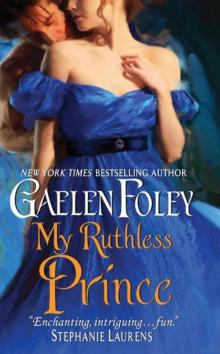 My Ruthless Prince
My Ruthless Prince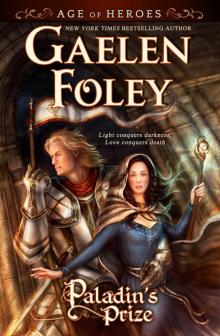 Paladin's Prize
Paladin's Prize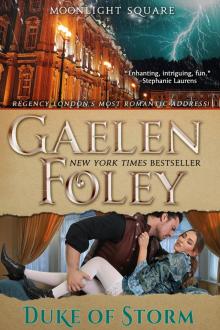 Duke of Storm
Duke of Storm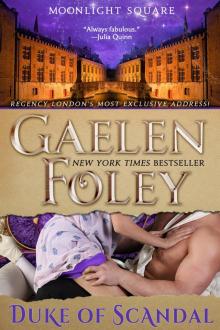 Duke of Scandal (Moonlight Square, Book 1)
Duke of Scandal (Moonlight Square, Book 1)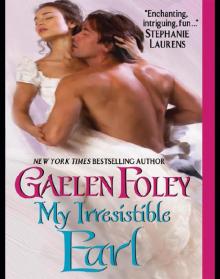 My Irresistible Earl
My Irresistible Earl Lady of Desire
Lady of Desire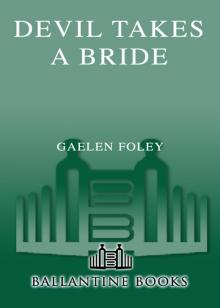 Devil Takes A Bride
Devil Takes A Bride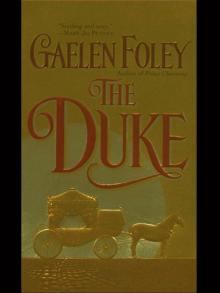 The Duke
The Duke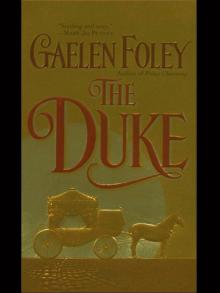 The Duke: The Knight Miscellany Series: Book 1
The Duke: The Knight Miscellany Series: Book 1 Her Secret Fantasy
Her Secret Fantasy Her Only Desire
Her Only Desire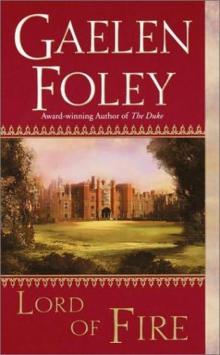 Lord of Fire
Lord of Fire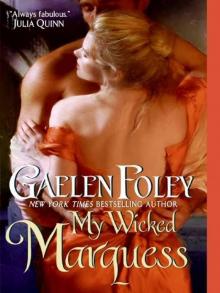 My Wicked Marquess
My Wicked Marquess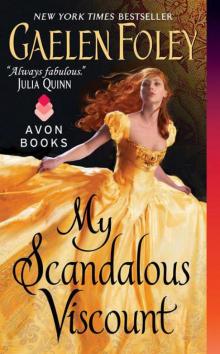 My Scandalous Viscount
My Scandalous Viscount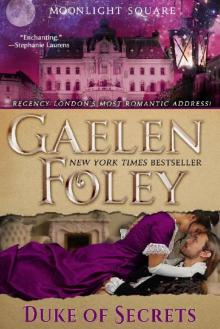 Duke of Secrets (Moonlight Square, Book 2)
Duke of Secrets (Moonlight Square, Book 2)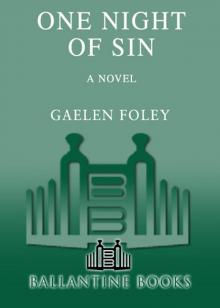 One Night of Sin
One Night of Sin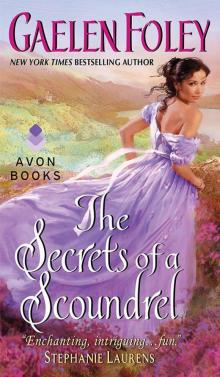 The Secrets of a Scoundrel
The Secrets of a Scoundrel Dream of Me (Harmony Falls, Book 1)
Dream of Me (Harmony Falls, Book 1) His Wicked Kiss
His Wicked Kiss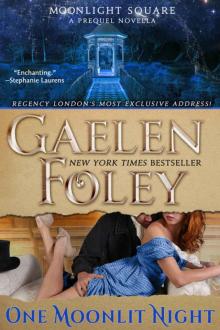 One Moonlit Night (Moonlight Square: A Prequel Novella)
One Moonlit Night (Moonlight Square: A Prequel Novella)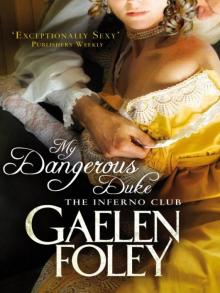 My Dangerous Duke
My Dangerous Duke